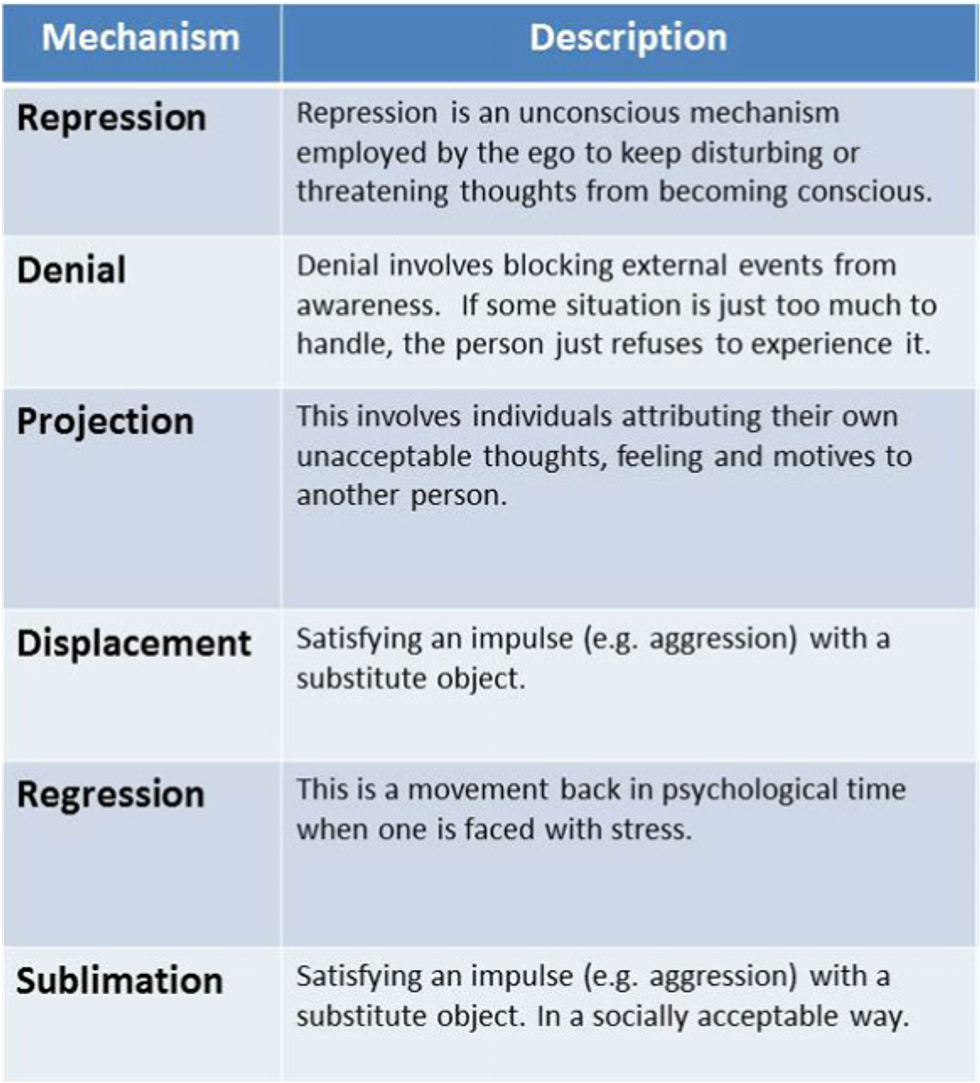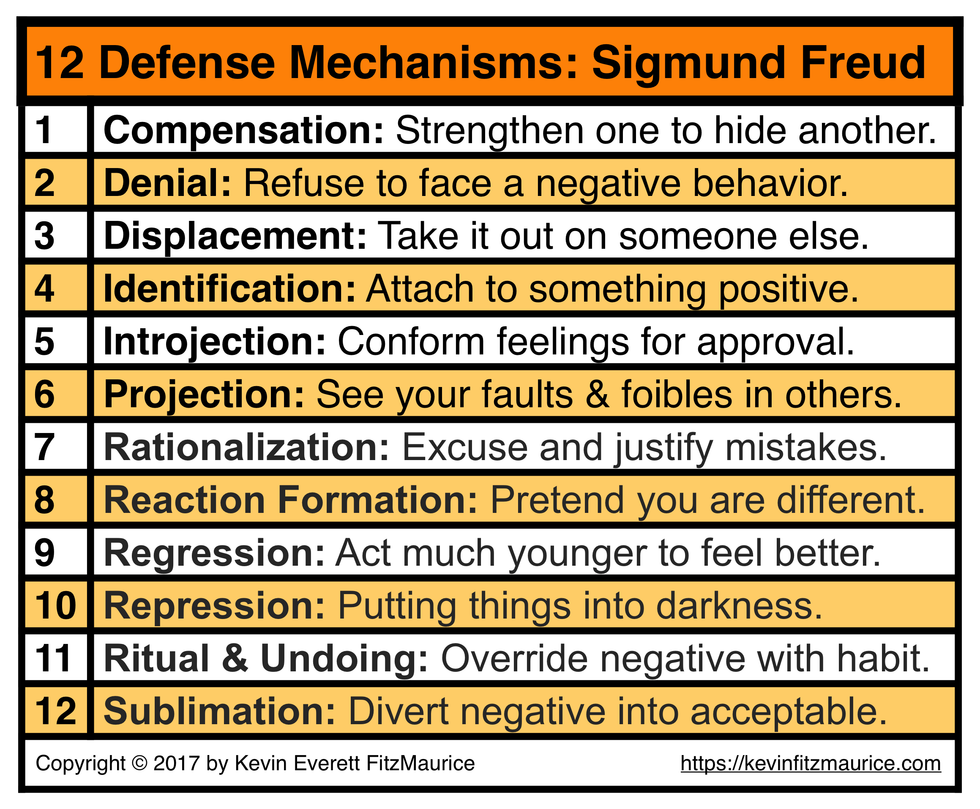"Being in a state of denial is a universally human response to situations which threaten to overwhelm. People who were abused as children sometimes carry their denial like precious cargo without a port of destination. It enabled us to survive our childhood experiences, and often we still live in survival mode decades beyond the actual abuse. We protect ourselves to excess because we learned abruptly and painfully that no one else would."
― Sarah E. Olson, Becoming One: A Story of Triumph Over Dissociative Identity Disorder
The phrase "ego" is used today to describe a bare identity. It can even be interchangeable with self-esteem or image. The origin of the phrase ego, along with it's brothers the superego and id, is Freudian. Although many of Freud's theories are outdated, they do hold significant meanings in psychological history. (In this article, the words "ego" will be used to describe the state of an individuals identity, not of one's "ability of the mind to assess the reality of the external world and to act upon it accordingly." - Sigmund Freud, "On Metapsychology," (p. 36).
I am by no means a clinical psychologist. I've taken a handful of psychology and sociology courses, so obviously I must be a genius. I jest, I jest! In fact, one of the least damaging and most effective defensive strategies is humor. Truthfully, I have only a rudimentary understanding of psychological theory, study, and practice. If you wish to delve into the roots of defensive study, I recommend beginning with Anna Freud's: "The Ego and the Mechanisms of Defense," (1937).

Freud's study in psychoanalysis has been used as a springboard for many modern psychological practices and theories. Freud and his daughter Anna sought to understand the relationship between the self and seemingly involuntary actions taken to protect the self. I seek to understand how my behavior and reception of behavior influences my sense of self. I also seek to understand a little bit of why people act the way they do toward others, ideas, or objects. Sometimes unintentionally and in-congruently.
For example, I'd like to know why I (and many others) use food and food restriction to make myself feel better (Displacement, Sublimation, denial...) and how I can manage that impulse in a healthy way. As they say, the first step to change is acceptance: the counterpoint to denial. Cognitive Behavioral Therapy or Rational Emotive Cognitive Behavior Therapy (RECBT) can be used to discover the underlying causes of problematic defensive actions and help soothe the burden maladaptive coping strategies can have. According to Psychology Today:
"The basic assumption of RECBT, developed by legendary psychologist Albert Ellis, is that positive emotional states arise when we interpret our experiences in ways that allow us to feel good about ourselves. We're not trying to protect ourselves from naughty desires, but from low self-esteemand feelings of disappointment in ourselves. The negative emotions we experience, such as anxiety and depression, arise from so-called irrational beliefs that we must be perfect, above reproach, and above all, loved."
Another example of defensive behavior would be the act of accusing, then condemning immigrants for stealing US land while ignoring the fact that this land was stolen to begin with (projecting). Can you come up with a couple examples on a micro (personal) and a macro (public) scale?

For a comprehensive list of defensive mechanisms, refer to this article on Psychologistworld.com.

Below, I supply a list of some of the most common defensive behaviors and how my experience relates to them. I use a list from PsychCentral to categorize the behaviors. The author, John M. Grohol, Psy.D., reminds readers that: "Remember, defense mechanisms are most often learned behaviors, most of which we learned during childhood. That's a good thing because it means that, as an adult, you can choose to learn some new behaviors and new defense mechanisms that may be more beneficial to you in your life"
1. Denial.
It's difficult to admit I am wrong, but I can and will. However, when things become too emotionally significant to me, I've found myself becoming increasingly irrational, frighteningly so. For example, I love animals — small ones, big ones, fluffy ones, shy ones — yet I continue to eat non-vegetarian. It hurts me so much to imagine the inside of a slaughterhouse, and yet I still choose to eat a McChicken. I think of the yellow baby chicks I used to coo at on my aunt's farm and I begin to freak out. I think, "I can't do anything to stop the systematic torture and consumption of animals." so I'd rather not think of it... Maybe I will try vegetarianism after all.
2. Acting Out.
This one is pretty obvious to me: I'm an actor. I believe my desire to perform and create stems from the protective drive against loneliness and mediocrity. Now that I know this, I can make a conscious choice to focus on the community of theater and the experience of living in the present.
3. Disassociation.
When I was eight-years-old, I was diagnosed with an eating disorder and dysphormia soon after. Since then, I've been a spectrum of sizes. I realize now I have severe trouble when visualizing by body shape and size. I refuse to buy clothing over a certain size or even step on a scale (denial). I avoid mirrors when I feel bloated or grotesque... I believe this is because of a knee-jerk reaction of dissociation, which leads me to feel as though I am not in control or even inside my own body, which THEN leads me to remove myself from the painful, shameful situation.
4. Reaction Formation.
Recently, I got into a misunderstanding which resulted in a theater professor verbally condemning me. I recall going into shock when being yelled at-- I was terrified that I would never be cast because she suddenly decided I was a nuisance. I recall telling my mother: "This time I will not cave in. I am going to tell her exactly how she is making me feel, how that isn't okay, and I won't let her walk all over me." Guess who went into her office later that week and let her walk all over me? Fearing her influence and retribution, I succumbed to intimidation and agreed with her behaviors in an attempt to save face. I still have unreleased anger over this.
5. Assertiveness.
Perhaps due to childhood feelings of abandonment, I tend to ensure my ideas and feelings are taken into account--as not to let myself feel expendable again.
6. Displacement.
I was neglected in my childhood, so I use those feelings of abandonment to motivate my desire to alleviate those feelings in others.
7. Repression.
I don't remember most of middle school due to the haunting and unbearable nature of the said institution.
So, think critically and honestly here... What are your defenses? Why do you use them? Are they healthy or are they degrading the quality of your life?



















